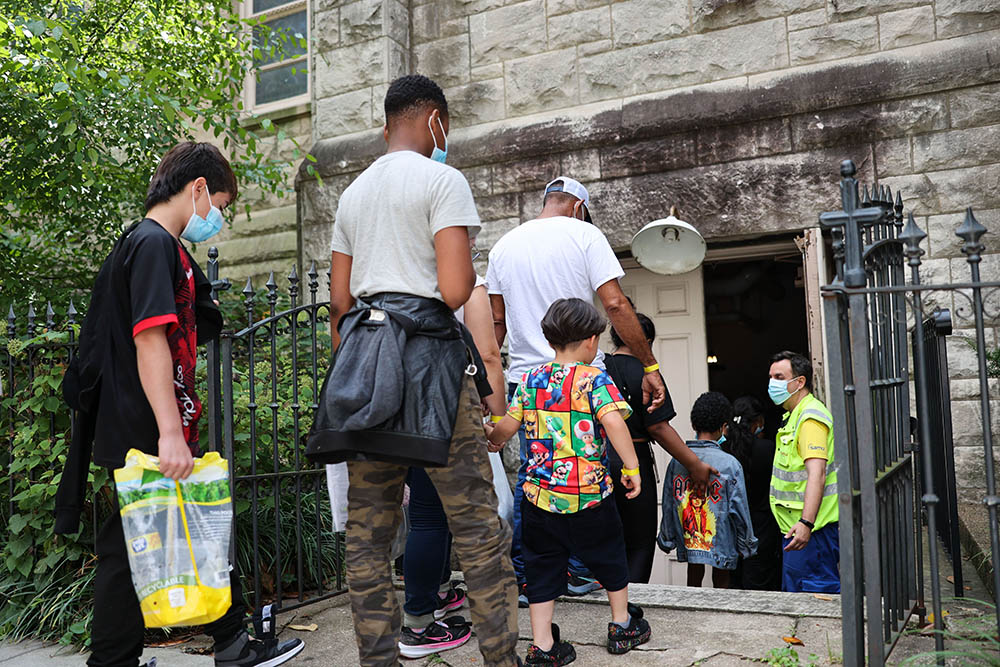
Migrants who arrived on a bus from Arizona step into the parish hall at St. Peter's Church on Capitol Hill in Washington Aug. 5, 2022. The local church, partnering with SAMU First Response, began offering hospitality in late July to migrants arriving on buses sent to Washington by the governors of Texas and Arizona. (CNS/Catholic Standard/Andrew Biraj)
When the governors of Florida and Texas started busing refugees to northern states last year, Chicago was on the list of blue cities to which these politicians (both Catholics, by the way) hoped to shift the "burden" of courageous people fleeing for their lives. As a Chicagoan, I was proud to see the city's civic and charitable infrastructure, including Catholic Charities, welcome them and to try to provide for their basic material needs.
I also learned about a group of individuals who were already assisting immigrants and refugees in the Windy City through an informal "Refugee Community Connection" Facebook group. Looking to donate some furniture, I had earlier become one of nearly 7,000 Chicago-area members of the group. What I've witnessed there is true neighborliness in action.
The group was formed initially to assist Special Immigrant Visa holders from Afghanistan and Iraq, people who had worked with the U.S. armed forces and whose lives were in danger after our military left those countries. More recently, they have been helping asylum seekers, primarily from Venezuela and other South and Central American countries.
The organizers match refugee families to volunteers who help provide resources, information and household necessities, including furniture, bedding and other household items, diapers, toiletries, clothing and footwear, groceries, computers and phones. They also run two all-volunteer "Free Stores," where items can be donated and refugee families can "shop" for the things they need.
Last summer, during a particularly dangerous heat wave, we were able to post our used window air conditioners (and more importantly, the willingness to deliver and install them) on the group's Facebook page. Within minutes, volunteers contacted us with details about their "adopted" families' needs. Two refugees' apartments became cooler and our storage room became cleaner!
Rather than be a source of division, social media can work as a mechanism for connection.
Advertisement
Now my Facebook feed is filled with conversations along the lines of: "Urgent need: Someone to drive a pregnant mom to the doctor" or "Two clean rugs available. Can deliver" or "Several men have gotten jobs but need work boots. See Amazon wish list below." The comment sections on these posts fill quickly with people willing to respond.
Although the group, its organizers and most members say little about any religious motivation, several area churches have provided space for storing and dropping off goods. To me, it's clear that this community is evidence of God's mercy in action. No one argues the politics of immigration, they just get coats on the backs of cold people and food in their stomachs. "Whatsoever you do ..."
Ash Wednesday is on Feb. 22, and as is often the case, I'm not prepared for Lent. Like many folks, I found it difficult to embrace fasting and other acts of sacrifice during the pandemic years, when we were already giving up so much already. Now that life has returned to some semblance of normalcy, that hardly seems like an excuse to avoid Lent's disciplines.
Yet I think "giving up for Lent" sometimes overshadows the other two Lenten disciplines: prayer and almsgiving. All three are supposed to remind us of our sinfulness and need for God's mercy. All three should then move us, in turn, to show mercy to others.
In my own life, God's mercy has often manifested itself as people who provide a shoulder to cry on, a way out of a problem, a reminder that I am a child of God and deserving of love.
Mercy has been a key message of the pontificate of Pope Francis, whose 10th anniversary as pope will coincide with Lent this year. But it is not enough to just receive mercy from God, Francis has said. We must be transformed by God's mercy and become "witnesses of mercy."
"Let us be renewed by God's mercy, let us be loved by Jesus, let us enable the power of his love to transform our lives too; and let us become agents of this mercy, channels through which God can water the earth, protect all creation and make justice and peace flourish," Francis said in his 2013 Easter message.
In his message on Divine Mercy Sunday in 2021, Francis summed it up this way: "Having received mercy, let us now become merciful."
That seems like a good Lenten message this year. Whether you show mercy to immigrants and refugees, other poor and needy, your own family, friends and colleagues, let this be our theme for the next 40 days.





